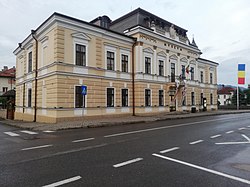| Județul Câmpulung | |
|---|---|
| County (Județ) | |
 Câmpulung County prefecture building of the interwar period, currently used as a museum. Câmpulung County prefecture building of the interwar period, currently used as a museum. | |
 Coat of arms Coat of arms | |
 | |
| Country | |
| Historic region | Bukovina |
| Capital city (Reședință de județ) | Câmpulung Moldovenesc |
| Established | 1925 |
| Ceased to exist | Administrative reform of 1950 |
| Area | |
| • Total | 2,349 km (907 sq mi) |
| Population | |
| • Total | 94,816 |
| Time zone | UTC+2 (EET) |
| • Summer (DST) | UTC+3 (EEST) |
Câmpulung County is one of the historic counties of the Kingdom of Romania, in the historical region of Bukovina. The county seat was Câmpulung Moldovenesc.
Geography
Câmpulung County covered 2,349 km and was located in the northern part of Greater Romania, in the southern part of Bukovina. Currently, the territory that comprised Câmpulung County is now included at present in Suceava County. In the interwar period, the county was bordered by Rădăuți County to the north, Suceava County to the east, Baia County to the southeast, Neamț and Mureș Counties to the south, and Năsăud County to the west.
History

After World War I, the territory of the county along with most of Transylvania was transferred from Austria-Hungary to Romania. This transfer was confirmed in the 1920 Treaty of Trianon. Based on the 1923 Romanian Constitution and the Law of Administrative Unification of 1925, Câmpulung County was established, with its capital at Câmpulung Moldovenesc. In 1938, the county was disestablished and incorporated into the newly formed Ținutul Suceava, but it was re-established in 1940 after the fall of Carol II's regime. In World War II, the county was part of the Bukovina Governorate and was later invaded and occupied by Soviet forces.
Following the administrative and territorial reform of 1950, made after the Soviet model, all counties were abolished and regions and districts established. The territory of the county then became part of Suceava Region. On 17 February 1968 the administrative and territorial divisions were returned to counties, but Câmpulung County was not re-established.
Administrative organization

Administratively, Câmpulung County was originally divided into three districts (plăși):
- Plasa Dorna, headquartered at Vatra Dornei
- Plasa Humor, headquartered at Gura Humorului
- Plasa Moldova, headquartered at Câmpulung Moldovenesc
Later, a fourth district was carved out from Plasa Moldova:
- Plasa Moldovița, headquartered at Vama
There were four urban localities in the county: Câmpulung Moldovenesc, Vatra Dornei, Gura Humorului, and Vama.
Population
According to the 1930 census data, the county population was 94,816, ethnically divided among Romanians (61.3%), Germans (20.2%), Jews (8.2%), Ukrainians (6.7%), Poles (1.8%), as well as other minorities. From the religious point of view, the population consisted of Eastern Orthodox (68.2%), Roman Catholic (16.9%), Jewish (8.2%), Lutheran (5.5%), as well as other minorities.
Urban population
The four urban localities of the county as of the 1930 census were: Câmpulung Moldovenesc (population 10,071), Vatra Dornei (9,826), Gura Humorului (6,042), and Vama (5,315).
In 1930, the county's urban population was 31,254, ethnically divided among Romanians (56.3%), Germans (22.6%), Jews (17.9%), Poles (1.5%), as well as other minorities. From the religious point of view, the urban population consisted of 55.6% Eastern Orthodox, 19.4% Roman Catholic, 17.9% Jewish, 5.2% Lutheran, 1.6% Greek Catholic, as well as other minorities.
References
- ^ "Portretul României interbelice - Județul Câmpulung" (in Romanian). memoria.ro. Retrieved 17 August 2016.
- ^ "Organizarea administrativ-teritorială a României 1864-1989" (in Romanian). bzf.ro. 7 May 2013. Archived from the original on 29 September 2014. Retrieved 17 August 2016.
- ^ Recensământul general al populației României din 29 decemvrie 1930, Vol. II, pag. 114-115
- ^ Recensământul general al populației României din 29 decemvrie 1930, Vol. II, pag. 578
External links
- (in Romanian) Câmpulung County on memoria.ro
Categories:
- Former counties of Romania
- Bukovina
- 1925 establishments in Romania
- 1938 disestablishments in Romania
- States and territories disestablished in 1938
- States and territories established in 1925
- 1940 establishments in Romania
- 1950 disestablishments in Romania
- States and territories established in 1940
- States and territories disestablished in 1950
